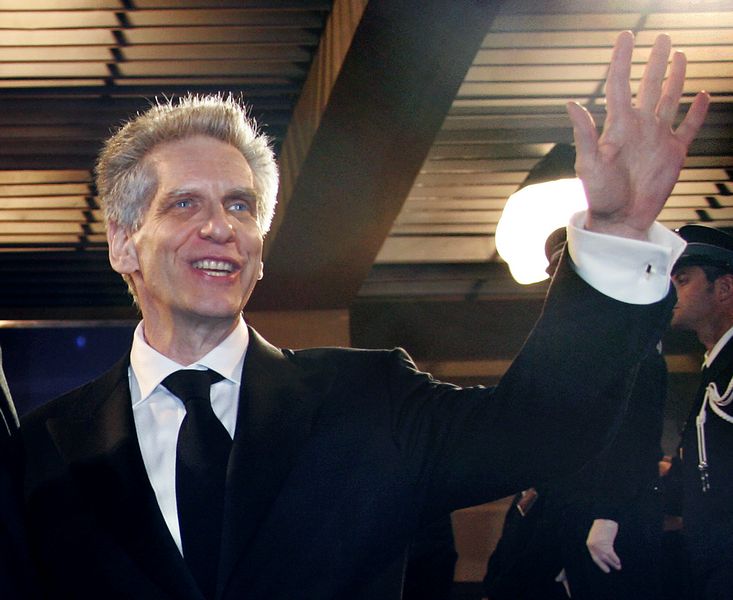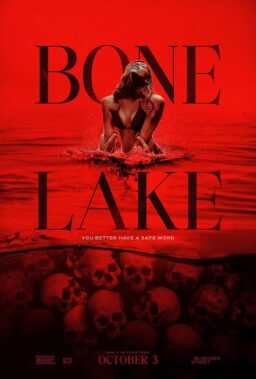CANNES, France — Regulars are beginning to murmur cautiously that this may be one of the best Cannes Film Festivals in recent years. Even Lars von Trier’s sequel to “Dogville” is a success. One strong film has followed another, and every day the buzz about possible festival winners gets revised.
The big audience success on Sunday was “A History of Violence,” by David Cronenberg, the Canadian who sometimes makes oblique studies of madness like “Spider” (2002) and sometimes makes inspired audience thrillers like this one. Not that it’s only a thriller; it’s more of a family drama in which violence is an unwelcome guest.
Viggo Mortensen stars in one of the best performances of his career, as a man named Tom Stall, who runs a diner in an Indiana town and lives peacefully with his wife (Maria Bello), teenage son (Ashton Holmes) and tiny daughter. One day two serial killers walk into the diner, thinking to kill and steal, and Tom hurls a pot of coffee, jumps over the counter, grabs a gun and kills them both. He becomes a media hero, which attracts unwelcome attention, and three tough guys in a big black car arrive in town. One of them, played by Ed Harris, has a horribly scarred face. Somebody blinded him with some barbed wire. Who could that have been?
How the movie unfolds I will leave for you to discover, along with a brief but indelible performance by William Hurt. None of the violence in the film is gratuitous, and all of it is necessary from Tom’s point of view and even from our own.
There may be an acting award for Mortensen from this film, but then again, Daniel Auteuil could win that prize for his work in Michael Haneke’s “Hidden,” which is also being mentioned for the Palme d’Or. He plays a Paris TV host whose happy family (his wife is played by Juliette Binoche) is also disturbed by unwelcome visitors — in this case, videos indicating the family is under surveillance. Who is sending these, and why? Answering the mystery has become a festival obsession, and Manohla Dargis of the New York Times writes brilliantly: “My guess is that the videotapes were not shot or sent by anyone; rather, they simply exist, ontologically, as evidence.” Yes, but if they were not shot or sent by anyone, how do they exist? Is ontological evidence visible to physical characters? In this movie, maybe.
The mystery leads eventually to the disintegration of Auteuil’s personality and his marriage, and to an onscreen death as surprising as any I have ever seen. Throughout the movie, many shots back off to regard the action objectively from a distance. That’s also the strategy of the videos.
Then comes the film’s last shot, also from a distance. It is composed in such a way that our attention is drawn to a character who turns out to be unimportant. Only observant audience members (such as myself) noticed that on the left side of the screen, a conversation is taking place between two people who should have no way of knowing each other. What does it mean that they do, and does that explain anything?
A sequel that tops the original
When Lars von Trier’s “Dogville” played here two years ago, it was not precisely a popular favorite, although it found defenders among some critics. It was a deliberately artificial period melodrama set in the Rockies in the 1930s and filmed on a bare set where streets, buildings and props were marked off with chalk and decorated with a few props.
Gangsters arrive in the town and institute a reign of terror designed to show the underlying violence of U.S. society. It was said that the film’s critics disliked it because it was anti-American. I disliked it because I thought it was very, very bad.
Now comes “Manderlay,” a sequel and also an official entry. Once again, a bare soundstage, chalk outlines, a few props. Once again, a plot that strains or perhaps even ruptures credulity. Bryce Dallas Howard steps into the role played by Nicole Kidman in the last film, as a gangster’s daughter. Her father and his gang drive from Colorado to Alabama, where they happen upon a cotton farm where slavery still exists, 65 years after it was abolished.
Howard sizes up the situation, makes patriotic speeches and idealistically decides to stay. Her dad lends her a few gangsters as helpers, and she frees the slaves and tries to institute a system of democracy. Some of the freed slaves are dubious about her methods, including an old and wise man played by Danny Glover.
The film uses language and description few American films would dare to use — both for matters of taste and because nobody talks that way. But somehow this time von Trier’s story and characters take over, and upstage the artificiality of the plot. His America is like a nightmare inspired by left-wing (and, for that matter, right-wing) paranoia, but a curious reality creeps into the situation, and there are moments that are genuinely powerful.
Other major successes: The South African film “U-Carmen eKhayelitsha,” which won the top award at Berlin in February, is playing here out of competition, and is wonderful. It’s a vivid version, bursting with life, of the Bizet opera, translated into the Xhosa language and sung by the magnificent Pauline Malefane and directed by Mark Dornford-May. Does the transition to a township near Cape Town work? The opera seems almost to have been written for its new location. Malefane and the other cast members are not only gifted singers but also better actors than many opera singers; no wonder the film was embraced at Berlin.
The movie everyone will know
Miranda July’s “Me and You and Everyone We Know” was my favorite film at Sundance, and I invited it to Ebertfest in April. Now it is having a big success here in the Critics’ Week; it’s eligible for the Camera d’Or award for best first film. The critic of the London Guardian wrote today that people mention two or three big films they admire, and then add that they saw this wonderful little film, and they’re afraid it will get overlooked. It has not been.
Another much-admired film is “Factotum,” by Bent Hamer, in the Directors’ Fortnight. It stars Matt Dillon as Charles Bukowski’s alter ego Henry Chinaski, the poet of Skid Row, and watches as he negotiates a series of brief employments, long hangovers and troubled but passionate romances. Lili Taylor and Marisa Tomei are two of the barflies who pass through his life.
Dillon has an uncanny feel for the character, and sometimes even looks like Bukowski, minus the acne. I recall his audio book recording of Kerouac’s On the Road, and again this time admire how Dillon captures the rhythm of a natural, untutored writer and outlaw.
And now I will sign off and turn to the dictionary and study the word “ontological,” which I have a feeling will become increasingly useful as we approach Saturday night and the awards.












